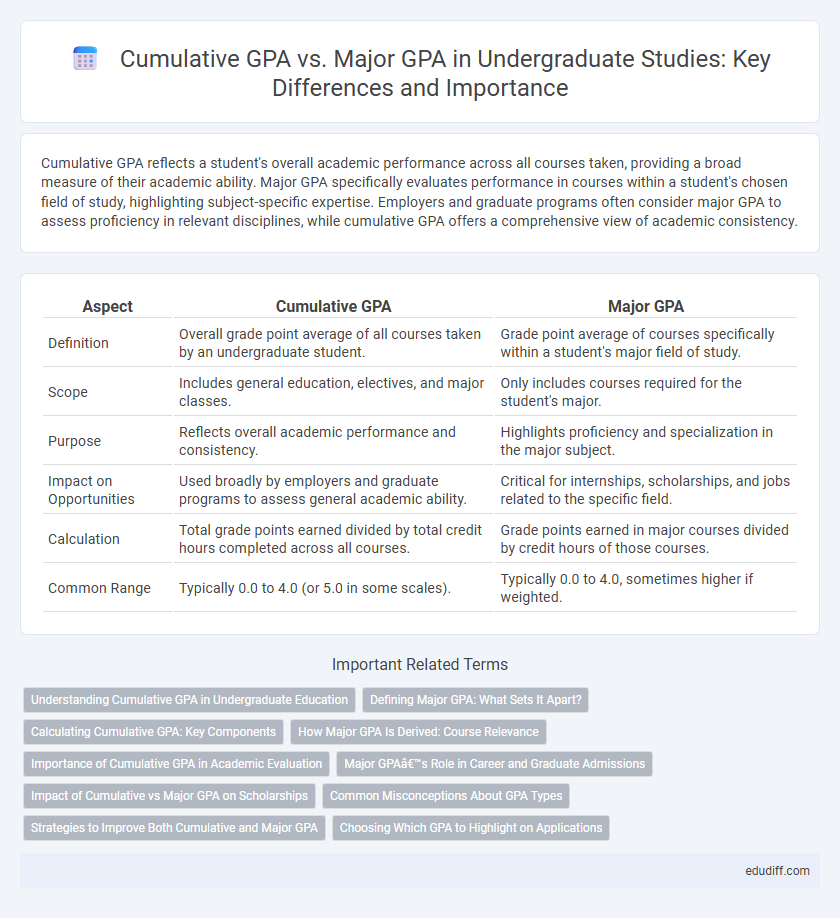Cumulative GPA reflects a student's overall academic performance across all courses taken, providing a broad measure of their academic ability. Major GPA specifically evaluates performance in courses within a student's chosen field of study, highlighting subject-specific expertise. Employers and graduate programs often consider major GPA to assess proficiency in relevant disciplines, while cumulative GPA offers a comprehensive view of academic consistency.
Table of Comparison
| Aspect | Cumulative GPA | Major GPA |
|---|---|---|
| Definition | Overall grade point average of all courses taken by an undergraduate student. | Grade point average of courses specifically within a student's major field of study. |
| Scope | Includes general education, electives, and major classes. | Only includes courses required for the student's major. |
| Purpose | Reflects overall academic performance and consistency. | Highlights proficiency and specialization in the major subject. |
| Impact on Opportunities | Used broadly by employers and graduate programs to assess general academic ability. | Critical for internships, scholarships, and jobs related to the specific field. |
| Calculation | Total grade points earned divided by total credit hours completed across all courses. | Grade points earned in major courses divided by credit hours of those courses. |
| Common Range | Typically 0.0 to 4.0 (or 5.0 in some scales). | Typically 0.0 to 4.0, sometimes higher if weighted. |
Understanding Cumulative GPA in Undergraduate Education
Cumulative GPA in undergraduate education reflects a student's overall academic performance across all courses taken, providing a comprehensive measure of their academic consistency and achievement. It aggregates grades from general education, electives, and major-specific classes, influencing eligibility for honors, scholarships, and graduate programs. Universities often prioritize cumulative GPA to assess a student's entire academic record, making it crucial for long-term academic and career opportunities.
Defining Major GPA: What Sets It Apart?
Major GPA specifically measures academic performance in courses directly related to a student's chosen field of study, providing a focused assessment of expertise and mastery within the major. Unlike Cumulative GPA, which averages all courses taken, Major GPA excludes general education and elective classes, highlighting subject-specific strengths and competencies. This targeted metric is essential for graduate school applications and career opportunities that prioritize specialized knowledge in a particular discipline.
Calculating Cumulative GPA: Key Components
Calculating cumulative GPA requires aggregating all course grades and credit hours completed throughout an undergraduate program, reflecting overall academic performance. Each course grade is converted into grade points based on a standardized scale, then multiplied by the course's credit hours to determine quality points. The cumulative GPA is the total quality points divided by the total credit hours attempted, providing a comprehensive measure of academic achievement across all subjects.
How Major GPA Is Derived: Course Relevance
Major GPA is derived by calculating the grade point average exclusively from courses directly related to a student's chosen field of study, emphasizing core subjects and advanced classes within the major. This focused calculation reflects a student's proficiency and depth of understanding in their specific academic discipline. Unlike Cumulative GPA, which includes all completed courses, Major GPA prioritizes course relevance to provide a more accurate measure of major-specific academic performance.
Importance of Cumulative GPA in Academic Evaluation
Cumulative GPA represents the overall academic performance across all courses taken during an undergraduate program, providing a comprehensive measure of a student's consistency and dedication. Academic institutions and employers often prioritize cumulative GPA as a key indicator of a student's general competence and ability to handle diverse subject matter. High cumulative GPA enhances eligibility for scholarships, graduate programs, and competitive internships, reflecting a well-rounded academic profile beyond specialized major courses.
Major GPA’s Role in Career and Graduate Admissions
Major GPA plays a crucial role in career opportunities and graduate admissions by highlighting a student's expertise and performance within their specific field of study. Employers and graduate programs often prioritize major GPA over cumulative GPA as it better reflects relevant knowledge and skills essential to the industry or discipline. Maintaining a strong major GPA can significantly enhance a student's competitiveness and demonstrate specialized proficiency to potential employers and academic institutions.
Impact of Cumulative vs Major GPA on Scholarships
Cumulative GPA reflects a student's overall academic performance across all courses, while Major GPA concentrates solely on courses within the student's field of study, both important metrics for scholarship eligibility. Scholarship committees often prioritize Major GPA to evaluate a student's proficiency and dedication to their chosen discipline, which can significantly impact scholarship awards in specialized fields. However, a strong Cumulative GPA remains crucial for competitive merit-based scholarships that assess overall academic excellence and consistency.
Common Misconceptions About GPA Types
Cumulative GPA reflects the overall academic performance across all courses taken, while Major GPA specifically measures grades within a student's chosen field of study, clarifying that high performance in one does not guarantee the same in the other. Many students mistakenly believe that employers or graduate programs prioritize cumulative GPA exclusively, overlooking the significance of a strong Major GPA in demonstrating subject-matter expertise. Understanding the difference between these GPA types helps undergraduates strategically improve their academic profiles based on their career goals.
Strategies to Improve Both Cumulative and Major GPA
To improve both Cumulative GPA and Major GPA, students should prioritize consistent study habits and allocate extra time to challenging core courses within their major. Utilizing academic resources like tutoring centers, study groups, and professor office hours can target weaknesses and enhance understanding of subject-specific material. Maintaining a balanced course load each semester helps manage academic stress and sustain high performance across all classes.
Choosing Which GPA to Highlight on Applications
Highlighting your Major GPA on applications can better showcase subject-specific expertise and impress employers or graduate programs seeking specialized knowledge. Cumulative GPA provides a broader academic performance measure but might dilute strengths in your major field. Selecting the GPA that aligns with the target program or job requirements enhances your application impact.
Cumulative GPA vs Major GPA Infographic

 edudiff.com
edudiff.com